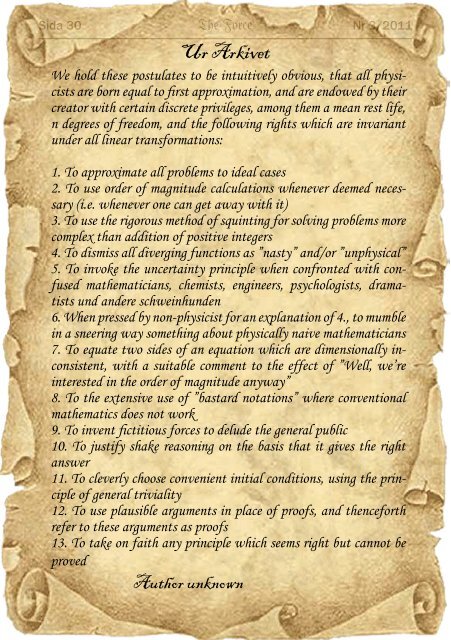Create successful ePaper yourself
Turn your PDF publications into a flip-book with our unique Google optimized e-Paper software.
Sida 30 The Force Nr 3/2011<br />
Ur Arkivet<br />
We hold these postulates to be intuitively obvious, that all physicists<br />
are born equal to first approximation, and are endowed by their<br />
creator with certain discrete privileges, among them a mean rest life,<br />
n degrees of freedom, and the following rights which are invariant<br />
under all linear transformations:<br />
1. To approximate all problems to ideal cases<br />
2. To use order of magnitude calculations whenever deemed necessary<br />
(i.e. whenever one can get away with it)<br />
3. To use the rigorous method of squinting for solving problems more<br />
complex than addition of positive integers<br />
4. To dismiss all diverging functions as ”nasty” and/or ”unphysical”<br />
5. To invoke the uncertainty principle when confronted with confused<br />
mathematicians, chemists, engineers, psychologists, dramatists<br />
und andere schweinhunden<br />
6. When pressed by non-physicist for an explanation of 4., to mumble<br />
in a sneering way something about physically naive mathematicians<br />
7. To equate two sides of an equation which are dimensionally inconsistent,<br />
with a suitable comment to the effect of ”Well, we’re<br />
interested in the order of magnitude anyway”<br />
8. To the extensive use of ”bastard notations” where conventional<br />
mathematics does not work<br />
9. To invent fictitious forces to delude the general public<br />
10. To justify shake reasoning on the basis that it gives the right<br />
answer<br />
11. To cleverly choose convenient initial conditions, using the principle<br />
of general triviality<br />
12. To use plausible arguments in place of proofs, and thenceforth<br />
refer to these arguments as proofs<br />
13. To take on faith any principle which seems right but cannot be<br />
proved<br />
Author unknown




